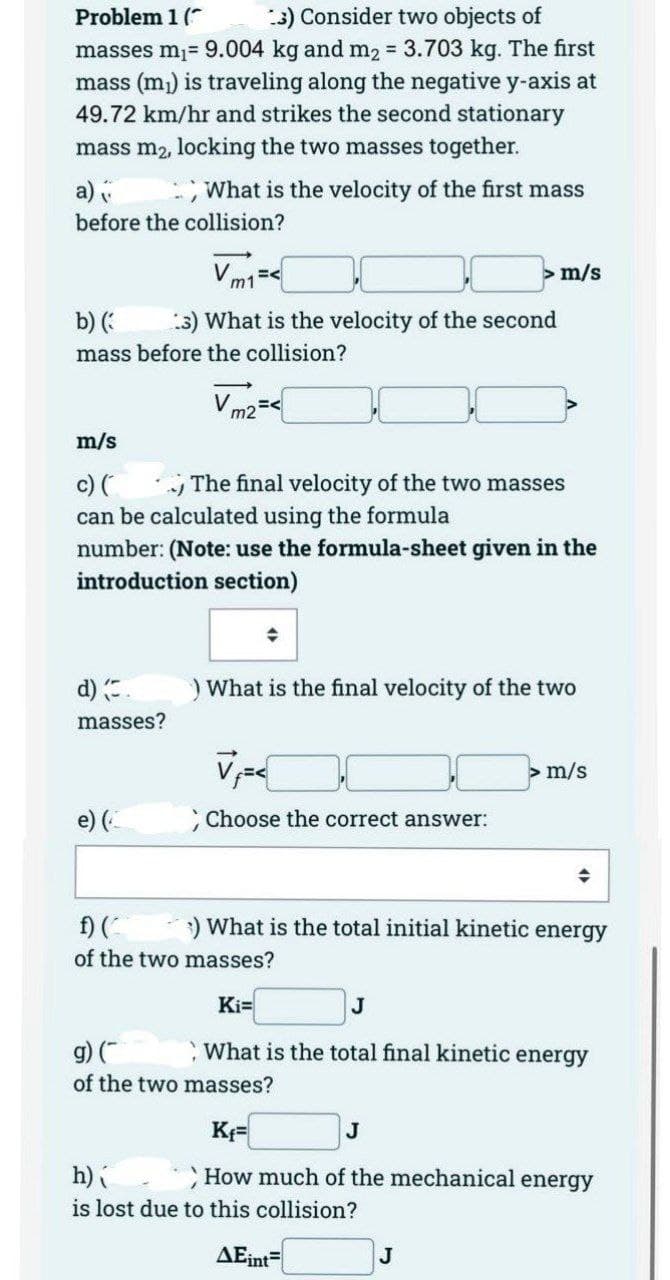Problem 1 ( 3) Consider two objects of masses m₁= 9.004 kg and m₂ = 3.703 kg. The first m2 mass (m₁) is traveling along the negative y-axis at 49.72 km/hr and strikes the second stationary mass m₂, locking the two masses together. a) What is the velocity of the first mass before the collision? V. m1 m₁ = < [ V > m/s b) ( 3) What is the velocity of the second mass before the collision? Vm2=< m/s c) ( The final velocity of the two masses can be calculated using the formula number: (Note: use the formula-sheet given in the introduction section) ) What is the final velocity of the two d) (. masses? V₁=< H > m/s
Problem 1 ( 3) Consider two objects of masses m₁= 9.004 kg and m₂ = 3.703 kg. The first m2 mass (m₁) is traveling along the negative y-axis at 49.72 km/hr and strikes the second stationary mass m₂, locking the two masses together. a) What is the velocity of the first mass before the collision? V. m1 m₁ = < [ V > m/s b) ( 3) What is the velocity of the second mass before the collision? Vm2=< m/s c) ( The final velocity of the two masses can be calculated using the formula number: (Note: use the formula-sheet given in the introduction section) ) What is the final velocity of the two d) (. masses? V₁=< H > m/s
College Physics
11th Edition
ISBN:9781305952300
Author:Raymond A. Serway, Chris Vuille
Publisher:Raymond A. Serway, Chris Vuille
Chapter6: Momentum, Impulse, And Collisions
Section: Chapter Questions
Problem 69AP: Two blocks of masses m1 and m2 approach each other on a horizontal table with the same constant...
Related questions
Question

Transcribed Image Text:Problem 1 (
3) Consider two objects of
masses m₁= 9.004 kg and m₂ = 3.703 kg. The first
mass (m₁) is traveling along the negative y-axis at
49.72 km/hr and strikes the second stationary
mass m₂, locking the two masses together.
a)
What is the velocity of the first mass
before the collision?
m/s
b) (
3) What is the velocity of the second
mass before the collision?
Vm2 =<
m/s
c) (
The final velocity of the two masses
can be calculated using the formula
number: (Note: use the formula-sheet given in the
introduction section)
) What is the final velocity of the two
d) (.
masses?
> m/s
; Choose the correct answer:
f) (
3) What is the total initial kinetic energy
of the two masses?
Ki=
J
g) (
What is the total final kinetic energy
of the two masses?
Kf=
J
h)
How much of the mechanical energy
is lost due to this collision?
AEint=
J
Expert Solution
This question has been solved!
Explore an expertly crafted, step-by-step solution for a thorough understanding of key concepts.
Step by step
Solved in 2 steps with 2 images

Knowledge Booster
Learn more about
Need a deep-dive on the concept behind this application? Look no further. Learn more about this topic, physics and related others by exploring similar questions and additional content below.Recommended textbooks for you

College Physics
Physics
ISBN:
9781305952300
Author:
Raymond A. Serway, Chris Vuille
Publisher:
Cengage Learning

Principles of Physics: A Calculus-Based Text
Physics
ISBN:
9781133104261
Author:
Raymond A. Serway, John W. Jewett
Publisher:
Cengage Learning

Physics for Scientists and Engineers with Modern …
Physics
ISBN:
9781337553292
Author:
Raymond A. Serway, John W. Jewett
Publisher:
Cengage Learning

College Physics
Physics
ISBN:
9781305952300
Author:
Raymond A. Serway, Chris Vuille
Publisher:
Cengage Learning

Principles of Physics: A Calculus-Based Text
Physics
ISBN:
9781133104261
Author:
Raymond A. Serway, John W. Jewett
Publisher:
Cengage Learning

Physics for Scientists and Engineers with Modern …
Physics
ISBN:
9781337553292
Author:
Raymond A. Serway, John W. Jewett
Publisher:
Cengage Learning

Physics for Scientists and Engineers, Technology …
Physics
ISBN:
9781305116399
Author:
Raymond A. Serway, John W. Jewett
Publisher:
Cengage Learning

Classical Dynamics of Particles and Systems
Physics
ISBN:
9780534408961
Author:
Stephen T. Thornton, Jerry B. Marion
Publisher:
Cengage Learning

College Physics
Physics
ISBN:
9781938168000
Author:
Paul Peter Urone, Roger Hinrichs
Publisher:
OpenStax College